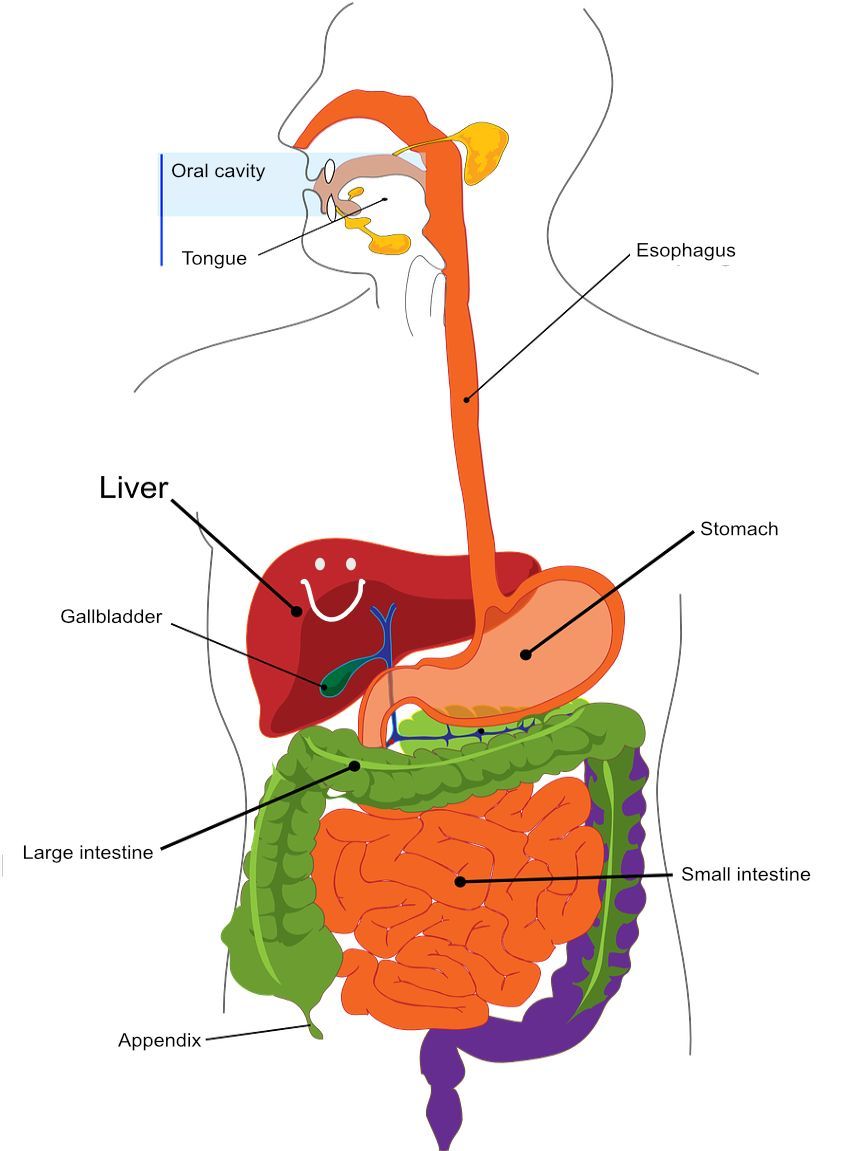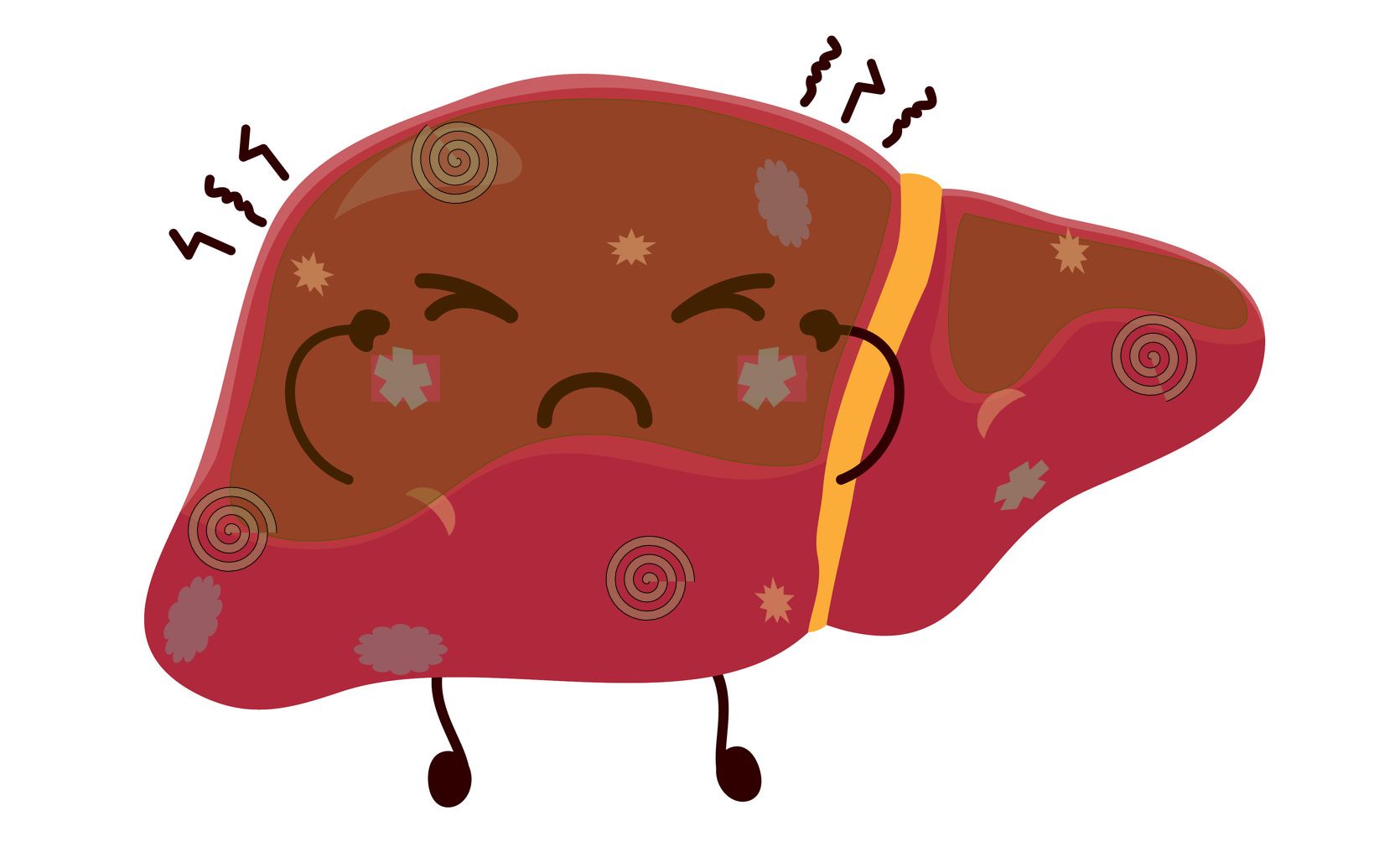How's your liver doing?
Drawing credit: Rachmat on Vecteezy
In light of Dry January, when many people choose to go a month without alcohol or reduce their alcohol consumption, it's encouraging to know that doing so is good for your liver. Since some liver problems don't have symptoms and you can't survive more than a day or two without your liver, it's smart to do what you can to take care of the one liver you're born with.
Let's start with the basics and move on to what scientists know about how your liver regenerates itself.
What does your liver do?
Your football-sized organ sits above your stomach and:
- It filters blood from the gastrointestinal system before it is delivered to your heart. This means removing toxins, including those that are toxic to your brain, and converting them into waste products. When this filtering is reduced or stops, toxic substances can circulate in the blood and reach the brain.
- Your liver produces proteins that help to balance the thickness of your blood.
- It creates bile which is used in food digestion and which helps the body to absorb nutrients and medications.
Your liver works hand-in-hand with your other organs, such as the intestines, heart, and brain. Thus, a liver that is in trouble affects how your other organs work.

Image credit: Clker-free-vector-images on Pixabay
What are various liver diseases?
Fatty liver - This is where fat builds up in the liver, causing swelling and damage. It can be caused by too much alcohol or there is a version called non-alcoholic fatty liver disease, where fat build-up occurs with little or no alcohol. For example, diabetes can cause and/or aggravate non-alcoholic fatty liver disease.
Fatty liver often has no symptoms, although warning signs can include a swollen abdomen, nausea, itching, or a yellow tint to the skin and the whites of the eyes. It is often first detected by blood tests for liver function, but blood tests can't tell how severe the condition is. To determine severity, an ultrasound and/or liver biopsy is performed.
Cirrhosis - Fatty liver can lead to cirrhosis, which is when liver cells are replaced with scar tissue, preventing the liver from functioning normally.
Liver cancer - refers to cancer that starts in the liver. In early stages of liver cancer, many people don't have symptoms, but when symptoms do appear, they can include: losing weight without trying, loss of appetite, upper abdominal pain, nausea, vomiting, general weakness/fatigue, abdominal swelling, jaundice, and white/chalky stools.
Liver failure - a liver that stops functioning can cause coma.
To note, liver dysfunction can cause a condition called hepatic encephalopathy, which is brain dysfunction. This condition can result in a wide variety of symptoms that can be mild or sever and that can occur suddenly or come on gradually and affect a person's:
- mood and personality
- behavior and impulse control
- memory, concentration, and thinking
- consciousness, lucidity, and sleep patterns
- coordination and motor functions
- autonomy and ability to care for oneself

Original drawing credit: Rachmat on Vecteezy
What can affect the health of your liver?
Genetics - some liver problems are inherited.
Viruses - certain types of hepatitis cause liver problems.
Medical conditions:
- High cholesterol - can increase the risk of getting fatty liver.
- High blood pressure - can also raise the risk of getting fatty liver.
- A person who has fatty liver and type 2 diabetes can see their fatty liver get worse if they don't manage their diabetes.
Some medications:
For example, taking more acetaminophen (paracetamol, Tylenol) than the recommended dose can cause damage, to the point of liver failure. Acetaminophen, the main active ingredient in Tylenol, is also commonly found in over-the-counter drugs such as Dayquil and Nyquil, Actifed, Alka-Seltzer, Sudafed, Robitussin, Dristan, Theraflu, etc., including corresponding store brands. Certain prescription medications also contain acetaminophen.
The recommended maximum dose for adults is 650 mg to 1000 mg every 4 to 6 hours, not to exceed a total of 4 grams per day. For children, maximums can vary depending on age and weight. Taking too much acetaminophen can happen, especially where several medications are taken at the same time. Be sure that you and your loved ones have consulted with a doctor or pharmacist before taking over-the-counter and/or prescription medications.
Another example of medications that can cause liver problems is heartburn medication (containing Proton Pump Inhibitors, or PPI). Again, please discuss with your doctor or pharmacist before taking such medication.
Lifestyle:
Alcohol - Mixing alcohol with drugs containing acetaminophen can be very dangerous. Alcohol on its own can begin to scar your liver, at a dose of just 4 oz per day of hard liquor for men (2 oz for women). 4 oz is half a cup.
Excess weight - where extra fat is stored in the body, including in the liver.
Diet high in fructose - initial research points to how high fructose corn syrup can damage the intestinal barrier, allowing bacteria and toxins to leak into the bloodstream, causing immune cells to react and produce an inflammatory response. There is also an increase in the level of enzymes that convert fructose into fatty deposits in the liver. To note, fructose used in processed foods is often high fructose corn syrup (HFCS), to watch out for on ingredient labels.

How does your liver regenerate?
We might be familiar with how a lizard which has lost its tail can regrow it. The lizard's body uses stem cells to reproduce the same structure, resulting in a new tail.
Your liver doesn't regrow in the same way. Instead, it compensates loss of liver tissue (from liver damage, organ donation, or liver cancer surgery) by growing the existing liver cells bigger. These existing cells respond to a signal to grow until they receive a signal to stop. The resulting "new" liver is approximately the same size as before the growth, although it might not have exactly the same shape.
A great thing about this process is that the liver continues its regular functions of cleaning the blood, regulating cholesterol, etc., all the while compensating for tissue loss!
Researchers are currently working on understanding how the signals work. The mechanisms of both starting and stopping the compensating growth are of course quite important.
One thing that scientists and doctors do know is that cyclical liver damage can lead to cirrhosis. For example, if a person has too much alcohol and develops fatty liver, stops drinking for a while to let the liver repair itself, resumes drinking, causing liver damage, stops drinking so the liver regenerates, and so on, this cycle causes scar tissue, which means cirrhosis.
So the liver can repair itself, but to a limit.
What can you do to take care of your liver?
From the information above, it is clear that reducing body fat by eating a balanced diet and exercising regularly, limiting alcohol, and paying attention to the medications and supplements you take are key. We would also suggest talking with your doctor or one of our pharmacists about your risk of hepatitis, as well as your risk for liver disease, especially if a family member has had it.
We would like to note that liver cleanses are not recommended as they have not been proven to rid the body of damage from excess consumption of food or alcohol. They have also not been proven to correct existing liver damage.
Why is taking care of your liver so important?
- You only have one.
- Its ability to regenerate itself is limited.
- It can affect the way your other organs work.
References and resources
- Liver Foundation on common medicines with acetaminophen - https://liverfoundation.org/wp-content/uploads/2022/06/Common-Medicines-with-Acetaminophen-Know-Your-Dose.pdf
- National Institute of Health (NIH) National Library of Medicine, National Center for Biotechnology Information (NCBI) on acetaminophen toxicity - https://www.ncbi.nlm.nih.gov/books/NBK441917/
- NIH News in Health on how your liver delivers - https://newsinhealth.nih.gov/2014/03/your-liver-delivers
- Mayo Clinic on how to protect your liver - https://www.mayoclinic.org/diseases-conditions/diabetes/expert-answers/diabetes/faq-20058461
- Johns Hopkins Medicine on detoxing your liver, fact versus fiction - https://www.hopkinsmedicine.org/health/wellness-and-prevention/detoxing-your-liver-fact-versus-fiction
- Mayo Clinic on liver cancer - https://www.mayoclinic.org/diseases-conditions/liver-cancer/symptoms-causes/syc-20353659
- American Liver Foundation on avoiding liver disease - https://liverfoundation.org/resource-center/blog/healthy-liver-tips/
- Radio Canada on how the liver regenerates itself - https://ici.radio-canada.ca/ohdio/premiere/emissions/moteur-de-recherche/episodes/946924/rattrapage-du-8-oct-2024-les-superpouvoirs-du-foie-et-le-carbone-capte-par-les-vieilles-forets
- Johns Hopkins Medicine on 5 ways to be kind to your liver - https://www.hopkinsmedicine.org/health/wellness-and-prevention/5-ways-to-be-kind-to-your-liver
- NCBI's list of selected medications and supplements and their toxicity to the liver - https://www.ncbi.nlm.nih.gov/books/NBK547852/#IX-A
- Cleveland Clinic on ammonia levels in the blood (it is toxic to the brain) - https://my.clevelandclinic.org/health/articles/22686-ammonia-levels
- Cleveland Clinic on hepatic encephalopathy - https://my.clevelandclinic.org/health/diseases/21220-hepatic-encephalopathy
- NIH on fungi in the gut linked to alcoholic liver disease - https://www.nih.gov/news-events/nih-research-matters/fungi-gut-linked-alcoholic-liver-disease
- MD Anderson Cancer Center on how the liver's ability to recover plays into liver cancer surgery - https://www.mdanderson.org/cancerwise/liver-regeneration--how-the-liver-s-ability-to-recover-plays-into-liver-cancer-surgery.h00-159623379.html
- BioTechniques on why sometimes a liver doesn't always renew itself - https://www.biotechniques.com/molecular-biology/how-does-the-liver-regenerate/
- NIH on how high fructose intake may trigger fatty liver disease - https://www.nih.gov/news-events/nih-research-matters/how-high-fructose-intake-may-trigger-fatty-liver-disease
- NIH on how blocking stomach acid may promote chronic liver disease - https://www.nih.gov/news-events/nih-research-matters/blocking-stomach-acid-may-promote-chronic-liver-disease
Note - The Pharmacy at Wellington's blog is written by a human :)





